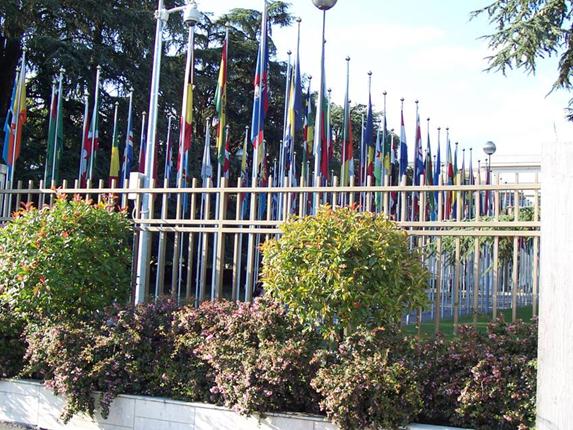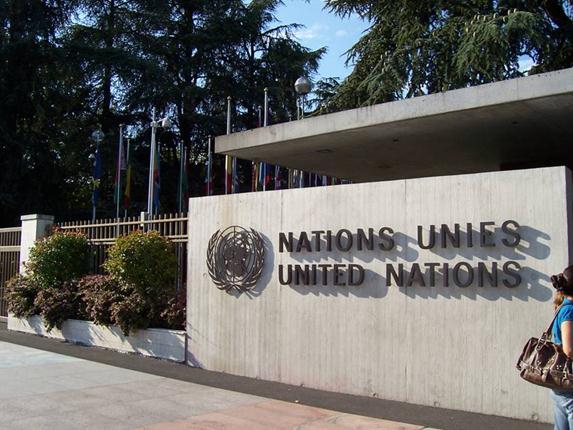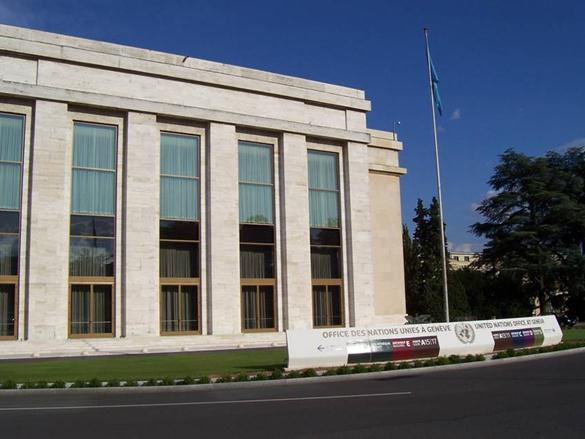Updated 10 May 2011
 In 2010, The World Federation of KSIMC was represented by Br Sameer Ladha at the various United Nations and NGO events in the New York, USA. The World Federation attended the UN General Assembly Meeting with NGO’s/Civil Society Organisations and the Private Sector, CONGO’s Civil Society Development Forum 2010 and the United Nation’s Summit on Millennium Development Goals. At these events, Br Sameer engaged with various organisations and officials in order to inform and raise awareness of the extensive activities undertaken by The World Federation towards the relieving poverty through Water and Sanitation, Education, Health and International Relief and Development initiatives.
In 2010, The World Federation of KSIMC was represented by Br Sameer Ladha at the various United Nations and NGO events in the New York, USA. The World Federation attended the UN General Assembly Meeting with NGO’s/Civil Society Organisations and the Private Sector, CONGO’s Civil Society Development Forum 2010 and the United Nation’s Summit on Millennium Development Goals. At these events, Br Sameer engaged with various organisations and officials in order to inform and raise awareness of the extensive activities undertaken by The World Federation towards the relieving poverty through Water and Sanitation, Education, Health and International Relief and Development initiatives.
Br Sameer Ladha is the Permanent Representative of The World Federation to the United Nations in New York. Br Sameer said “The World Federation’s attendance to these UN meetings has established a presence as a credible international humanitarian NGO which is important on the international stage. Many organisations were introduced to activities of The World Federation. As we continue to engage with the wider community at the UN, we will ensure that we will develop good networks and relationship with the UN entities and affiliated NGOs.”
Imran Janmohamed, The Development Manager for The World Federation, said, “It is vital for The World Federation to engage with the various global networks in the highest echelons of the international community. The presence of The World Federation in these meetings increases the awareness, credibility and creates vital networks for our organisation. We are truly grateful to Sameer for taking his time in attending these meetings.
The International Relief and Development of The World Federation is in the process of developing a directory of individuals who involved with NGO sector globally. Click here to register your information.
For further information, email ngo@world-federation.org
The World Federation participates in the UN General Assembly with NGO’s, Civil Society Organisations and the Private Sector
In 14-15 June 2010, The World Federation of KSIMC attended the Interactive Hearings at The United Nations headquarters in New York, in order to engage with the various organisations toward the progress of the Melleium Development Goals. The hearings were held in the company of esteemed diplomats and other delegates to provide an open forum for dialogue between NGOs, civil society and governmental entities. The focus of the discussion was on the immediate need for planning to realize the Millennium Development goals in 2015.
The forum provided a platform for various NGOs and other members of civil society to not only highlight their efforts in meeting specific MDGs but also their suggestions on how to strategize so that the MDGs can be met in a timely manner. Suggestions to extend the timeline for adequate implementation of the MDGs were also made. The sessions provided a unique opportunity for governments to hear what civil society is engaged in, where they need assistance from governments and how the two can to proceed forward in a mutually beneficial manner. Through their individual participation, NGOs were given the opportunity to present their views on the MDGs, and engage with governmental bodies, with the hope of an ensued dialogue.
Numerous NGOs and members of civil society took the stage. The plight of indigenous people was often discussed, ranging from their general safety to the preservation of their rights. MDG 8 was also a strong topic of discussion, where NGOs spoke of the need, necessity, and basic right to affordable drugs in developing countries, particularly those in Africa. MDGs relating to women’s rights, human rights, and sexual and reproductive rights were also discussed in detail.
On the second day of the hearings, Ms. Constance Okollet, a speaker from Uganda presented a compelling case. Focusing her discussion on her native land, she spoke of farming and climate change, arguing that the industrialization in the richest countries has contributed to climate change, resulting in the poorest countries suffering the greatest. This inequity needs to be adequately redressed for effective and comprehensive implementation of the MDGs.
A key point that reverberated through many of the addresses was the absence of reference to human rights in the outlook document. This reference was included in the millennium document but was subsequently removed. Numerous NGOs promulgated the inclusion of references to human rights in the document because the term catalyzes governments to implement better policies and get things done.
The informal hearings covered topics of great breadth and scope, as encapsulated in the MDGs. In totality, the whole gamut of issues was covered, including climate change, costs of development, education, farming, women, migrants, workers, and HIV. The sessions were well-attended with 519 representatives from 339 organizations over a two-day period. MDG implementation by 2015 was the greatest concern. It is compelling to consider calls for halving the world’s poverty by 2015, a challenge further exacerbated by the current economic crisis. The hearings, however, concluded on a positive note. Gathering new resolve of collectively diverse voices, the delegates concurred that the MDGs are achievable and failure is neither an option nor acceptable.
The meeting also provided an opportunity for The World Federation to brief some of the key officials of the services the World Federation has been providing in various part of the world over the last 26 years in the field of healthcare, religious and secular education, housing and economic upliftment.

Civil Society Development Forum 2010 Report - Women’s Human Rights & Development
The World Federation of KSIMC represented by Br Sameer Ladha, attended the Civil Society Development Forum from 4-5 May 2010 in New York, USA. The Forum was hosted by The Conference of Non-Governmental Organizations in Consultative Relationship with the United Nations (CONGO), of which The World Federation is a member of. CONGO is an independent, international, non-profit membership association of non-governmental organizations (NGOs). It facilitates the participation of NGOs in United Nations debates and decision-making.
The keynote presentations of the Forum addressed the general theme of the causes and consequences of the world economic crisis and its impact on women of all ages. The meeting closed with a plenary session comprised of a line by line discussion and drafting session of the Draft CSDF 2010 Outcome Document.
Click here for the full report of the Forum.

The UN Summit on the Millennium Development Goals in September 2010
The World Federation of KSIMC was represented by Br Sameer Ladha at the High Level UN Summit on the Millennium Development Goals from 20-22 September 2010 in New York, USA. The primary objective of the Summit was to accelerate progress towards all the Millennium Development Goals (MDGs) by 2015, taking into account the progress made towards the internationally agreed development goals. The Secretary-General of the United Nations, Ban Ki-moon and Heads of States and Governments, along with the private sector, foundations, international organizations, civil society and research organizations, concerted worldwide effort to accelerate progress on women's and children's health.
The three day UN Summit focussed on the comprehensive review of successes, best practices and lessons learned, obstacles and gaps, challenges and opportunities in achieving the MDGs. It concluded with the adoption of a global action plan to achieve the eight anti-poverty goals by their 2015 target date and the announcement of major new commitments for women's and children's health and other initiatives against poverty, hunger and disease. The Secretary-General Ban Ki-moon said, “We know what works to save women’s and children’s lives, and we know that women and children are critical to all of the MDGs, Today we are witnessing the kind of leadership we have long needed.”
The Summit's outcome document recognised the many interlink ages between the MDGs and set out a number of cross-cutting interventions that drive progress across all the Goals: in particular, investing in expanded opportunities for women and girls and improving access to energy. With pledges of more than $40 billion over the next five years, the potential of saving the lives of more than 16 million women and children, preventing 33 million unwanted pregnancies, protecting 120 millions of children from pneumonia and 88 million children from stunting, advancing the control of deadly diseases such as malaria and HIV/AIDS, and ensuring access for women and children to quality facilities and skilled health workers.
The global commitment at the Summit
The fact sheet of the Summit.
The World Federation submits its statement on the role of women in development
In June 2010, The World Federation submitted a statement to the UN ESOSOC on the organisations commitment to the role of women in advancing global development, as part of the annual high-level meeting of the United Nations Economic and Social Council (ECOSOC) in July 2010. The event concluded with Member States of the United Nations stressing the need for greater investment in women and girls and outlining concrete steps to advance gender equality and empower women.
The statement noted, “The World Federation has learnt that entire societies develop when women and youth are empowered to fully contribute to the agenda. In light on this year’s Annual Ministerial Review theme of implementing the commitments with regard to Gender Equality and the Empowerment of Women, The World Federation would like to applaud the role of the United Nations in ensuring that gender is a key element in all development aspects. The World Federation ensures that its activities address the importance of gender equality for benefit of the community and humanity at large. The values of the organisation are enshrined in the values of Islam which clearly empower women to take greater social and economic responsibility in the development of a highly effective community.”
“In order to provide education for the poor in the deprived regions of India and Pakistan, The World Federation administers seven schools in partnership with local agencies. It ensures that the ratios of girls to boys are maintained to the required standards to avoid gender disparity. Education sponsorships to students in 15 countries ensure girls have the same opportunity to learn as boys. Inadequate health are a barrier to the realisation of women’s development, therefore The World Federation’s healthcare centres provide medical treatment to the poor, especially women and children, as they are the foundation of the family unit. The relief activities, microfinance initiatives and economic upliftment programs undertaken by The World Federation are available for both women and men equally.”
In the Annual Meeting, a ministerial declaration was adopted at the end of its week-long meeting, the 54-member Council stressed the need to invest more in women and girls, which is essential to achieving the Millennium Development Goals (MDGs) – the set of eight human development and poverty eradication targets with a 2015 deadline.